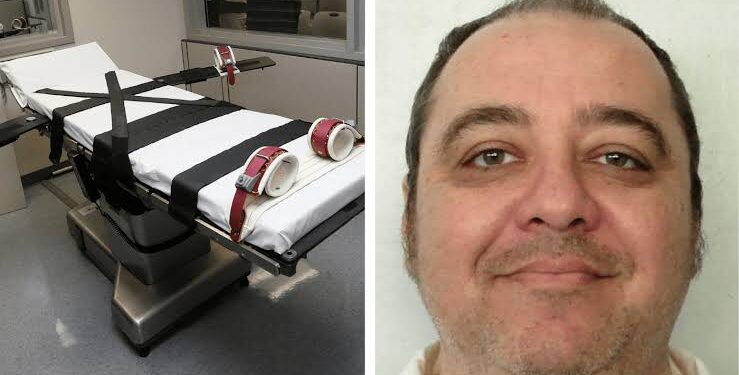Alabama executed Kenneth Eugene Smith, a convicted murderer, using nitrogen gas—a controversial method criticized by human rights advocates.
This marks the first instance of such execution in the United States. Smith, found guilty of the 1988 murder-for-hire of a pastor’s wife, spent over three decades on death row.
The execution took place at Holman Prison in Atmore, Alabama, involving the administration of nitrogen hypoxia. Witnesses reported that Smith began “writhing and thrashing” for two to four minutes, followed by heavy breathing lasting around five minutes.
Alabama Department of Corrections Commissioner John Hamm mentioned that Smith appeared to be “holding his breath as long as he could,” with expected “involuntary movement” and gasping.
A previous execution attempt in November 2022, using lethal injection, had failed due to difficulties in setting intravenous lines. Robin Maher, executive director of the Death Penalty Information Center, criticized Alabama for using an “untested, unproven method of execution,” emphasizing its unprecedented nature.
Smith’s last words expressed disapproval, stating, “Tonight, Alabama caused humanity to take a step backwards.” He left with messages of love and gratitude for supporters.
The UN rights office, represented by spokeswoman Ravina Shamdasani, had urged Alabama to reconsider, highlighting the “novel and untested” method’s potential violation of international human rights laws, possibly amounting to torture.
Alabama’s protocol for nitrogen asphyxiation lacks provisions for sedation, raising concerns about its humaneness. The state defended the method, claiming it as “perhaps the most humane method of execution ever devised.”
Kenneth Smith and accomplice John Parker were convicted of the 1988 murder of Elizabeth Sennett, for which they received $1,000 each. Parker was executed in 2010. Mike Sennett, Elizabeth’s son, spoke after the execution, describing the day as “bittersweet” for his family.
Despite Smith’s appeal for a stay of execution to the US Supreme Court, the request was denied. Public support for the death penalty in the US has declined to 53%, the lowest since 1972. Capital punishment is abolished in 23 states, with six others temporarily halting its use.











